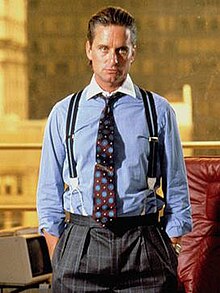Gordon Gekko
This article is missing information about the nature of the character. (March 2018) |
| Gordon Gekko | |
|---|---|
| Wall Street character | |
 | |
| First appearance | Wall Street (1987) |
| Last appearance | Wall Street: Money Never Sleeps (2010) |
| Created by | Oliver Stone Stanley Weiser |
| Portrayed by | Michael Douglas[1] |
| In-universe information | |
| Occupation | Corporate raider Author |
| Spouse | Kate Gekko (ex-wife) |
| Children | Rudy Gekko (son) (deceased) Winnie Gekko-Moore (daughter) |
| Relatives | Jacob Moore (son-in-law) Louis Moore (grandson) |
| Nationality | American |
Gordon Gekko is a composite character in the 1987 film Wall Street and its 2010 sequel Wall Street: Money Never Sleeps,[2] both directed by Oliver Stone. Gekko was portrayed by actor Michael Douglas, whose performance in the first film won him an Oscar for Best Actor.[3]
Co-written by Stone and screenwriter Stanley Weiser, Gekko is said to be based loosely on several actual financiers, including Stone's own father Louis Stone[4] and corporate raider Asher Edelman.[5] According to Edward R. Pressman, producer of the film, "Originally, there was no one individual who Gekko was modeled on," but added that "Gekko was partly Milken", who was the "Junk Bond King" of the 1980s.[6]
In 2003, the American Film Institute named Gordon Gekko No. 24 on its Top 50 movie villains of all time.[7]
Cultural impact
Gekko has become a symbol in popular culture for unrestrained greed (with the signature line, "Greed, for lack of a better word, is good"), often in fields outside corporate finance.
On September 25, 2008, Michael Douglas, acting as a UN ambassador for peace, was at the 2008 session of the United Nations General Assembly. Reporters sought to ask him off-topic questions about Gekko. He was asked whether he "bore some responsibility for the behavior of the greed merchants who had brought the world to its knees". Trying to return to topic, Douglas suggested that "the same level of passion Wall Street investors showed should also apply to getting rid of nuclear weapons."[8] Douglas was also asked to compare nuclear Armageddon with the "financial Armageddon on Wall Street". After one reporter inquired, "Are you saying, Gordon, that greed is not good?" Douglas stated, "I'm not saying that. And my name is not Gordon. It's a character I played 20 years ago."[8][9]
On October 8, 2008, the character was referenced by Australian Prime Minister Kevin Rudd in his speech, "The Children of Gordon Gekko" concerning the financial crisis of 2007–2010. Rudd stated "It is perhaps time now to admit that we did not learn the full lessons of the greed-is-good ideology. And today we are still cleaning up the mess of the 21st-century children of Gordon Gekko."[10]
In the October 30, 2008 episode of American comedy series The Office, Ryan Howard's Halloween costume is Gordon Gekko.
On July 28, 2009, Cardinal Tarcisio Bertone cited Gekko's "Greed is good" slogan in a speech to the Italian Senate, saying that the free market had been replaced by a greed market, and also blamed such a mentality for the 2007–2008 financial crisis.[11]
The FBI has used Michael Douglas' Gekko for an anti-insider trading campaign.[12][13][14][15][16]
In 2013, psychiatrists Dr. Samuel Leistedt and Dr. Paul Linkowski published a study of the portrayal of psychopaths in film, and cited the Gekko character as a realistic portrayal of the successful, "corporate psychopath": "In terms of a ‘successful psychopath," they write, "Gordon Gekko from Wall Street (1987) is probably one of the most interesting, manipulative, psychopathic fictional characters to date."[17]
The character Gordon Gekko is commemorated in the scientific name of a species of gecko, Cyrtodactylus gordongekkoi.[18]
See also
- Margin Call
- Swimming with Sharks
- The Wolf of Wall Street
- Wall Street (1987 film)
- Wall Street: Money Never Sleeps
Notes
- ^ "Gordon Gekko, Preaching the Gospel of Greed". NPR. Retrieved 2010-09-26.
- ^ Burrough, Bryan (February 2010). "The return of Gordon Gekko". Vanity Fair. Retrieved 2010-01-16.
- ^ Osborne, Robert A. (1999). 70 years of the Oscar: the official history of the Academy Awards. Abbeville Press. p. 286. ISBN 978-0-7892-0484-4.
- ^ Anthony Vieira (September 23, 2010). "Review: Wall Street Money Never Sleeps". The Film Stage. Retrieved 14 March 2015.
- ^ Vardi, Nathan. "Greed is so-so". forbes.com. Forbes. Retrieved 2 October 2015.
- ^ Simon Goodley (28 August 2007). "Brace yourself, Gekko is back". The Daily Telegraph. Retrieved 14 March 2015.
- ^ "AFI 100 years...100 heroes and villains". American Film Institute. Retrieved 2010-01-16.
- ^ a b Phillip Coorey (26 September 2008). "Michael who? It's Gekko we're after". The Sydney Morning Herald.
- ^ "Douglas goes nuclear: I'm not Gordon Gekko!". Fairfax Digital. 25 September 2008.
- ^ Kevin Rudd (6 October 2008). "Edited extract of the speech: The children of Gordon Gekko". The Australian. Archived from the original on 16 January 2009. Retrieved 6 October 2008.
- ^ Krause-Jackson, Flavia (July 28, 2009). "Vatican Slams 'Greed Is Good' Wall Street Mantra". Bloomberg News. Retrieved 2010-08-09.
- ^ Protess, Ben; Ahmed, Azam (2012-02-27). "Michael Douglas Tackles Greed for F.B.I". The New York Times.
- ^ Palazzolo, Joe (2012-02-27). "Gordon Gekko Is Cooperating with the FBI". The Wall Street Journal.
- ^ "Gordon Gekko: Greed Is Bad". The Wall Street Journal. 2012-02-27.
- ^ Strasburg, Jenny; Albergotti, Reed (2012-02-28). "Insider Targets Expanding". The Wall Street Journal.
- ^ "Most Popular E-mail Newsletter". USA Today. 2012-02-27.
- ^ Perry, Susan (January 17, 2014). "Why psychopathic film villains are rarely realistic — and why it matters". Minnpost. Minneapolis, Minnesota. Retrieved June 21, 2018.
- ^ Beolens, Bo; Watkins, Michael; Grayson, Michael (2011). The Eponym Dictionary of Reptiles. Baltimore: Johns Hopkins University Press. xiii + 296 pp. ISBN 978-1-4214-0135-5. ("Gordon Gekko", p. 104).
External links
This article's use of external links may not follow Wikipedia's policies or guidelines. (March 2018) |
